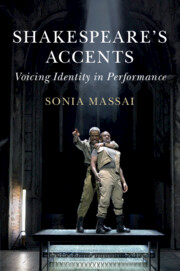6 results

Shakespeare's Accents
- Voicing Identity in Performance
-
- Published online:
- 07 May 2020
- Print publication:
- 09 April 2020
Chapter 2 - ‘Lend Me Your Ears’: Experiments with Original Pronunciation
-
- Book:
- Shakespeare's Accents
- Published online:
- 07 May 2020
- Print publication:
- 09 April 2020, pp 70-101
-
- Chapter
- Export citation
Part XX - Changing Technologies of Stage Performance
-
-
- Book:
- The Cambridge Guide to the Worlds of Shakespeare
- Published online:
- 17 August 2019
- Print publication:
- 21 January 2016, pp 1417-1482
-
- Chapter
- Export citation
203 - Original Practices
- from Part XX - Changing Technologies of Stage Performance
-
-
- Book:
- The Cambridge Guide to the Worlds of Shakespeare
- Published online:
- 17 August 2019
- Print publication:
- 21 January 2016, pp 1474-1482
-
- Chapter
- Export citation
25 - Pronunciation and OP on the Modern Stage
- from Part III - Language
-
-
- Book:
- The Cambridge Guide to the Worlds of Shakespeare
- Published online:
- 17 August 2019
- Print publication:
- 21 January 2016, pp 178-183
-
- Chapter
- Export citation
Part III - Language
-
-
- Book:
- The Cambridge Guide to the Worlds of Shakespeare
- Published online:
- 17 August 2019
- Print publication:
- 21 January 2016, pp 161-246
-
- Chapter
- Export citation

